ENT Disorders
Ear Disorders
There are many different types of ear disorders, some more common than others. For example, one of the most common causes of ear infections is bacteria or a virus. Hearing loss may be caused by several factors, including injury, aging, and birth defect, and can happen gradually over time. There are treatments available for hearing loss, but treatment will depend on the severity of the condition and other factors such as age and occupation. Consult an ENT doctor if you believe you’re experiencing any symptoms of an ear disorder.
- Hearing loss
- Ear Infections
- Audiological Diagnostic Testing
- Implantable Devices
- Hearing Aids
- Vertigo
- Tinnitus
- Neurotology
Hearing loss
There are a variety of reasons you may be experiencing hearing loss. The most common cause is exposure to loud noise. This includes using power tools, attending rock concerts, or listening to music too loudly on your headphones. Other causes include:
- Aging
- Diabetes
- Autoimmune disorder
Hearing loss may not mean permanent damage to your ears, but it does require medical attention for the problem that caused it. You should see an audiologist or otolaryngologist if you have hearing loss. They can diagnose the severity with testing.


Once diagnosed, you’ll devise a treatment plan with your ENT doctor. This may include reducing or eliminating exposure to loud noises, getting ear protection for loud places, or taking hearing aids if needed.
Extra Tip
You should consider changes you can make in your lifestyle, like quitting smoking and not using certain medications that may cause hearing loss.
Ear Infections
An ear infection is a bacterial or viral infection of the middle ear. There are two types of ear infections: otitis media and otitis externa (swimmer’s ear). Otitis media affects the eardrum and usually occurs after an upper respiratory infection. It can cause symptoms such as:
- Decreased hearing
- Fever
- Pain
- Drainage from the ear
- Bad smell coming from the
- Ear canal
- Headaches
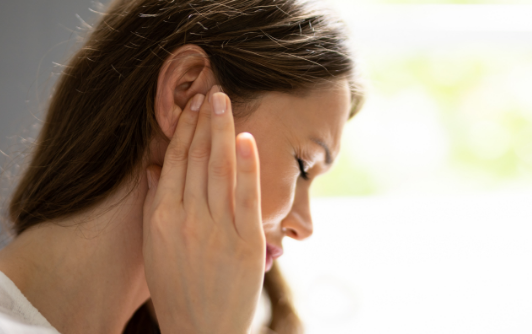
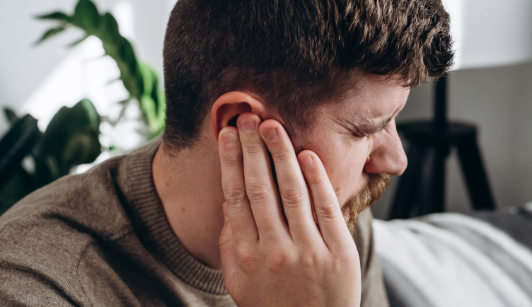
Extra Tip
Keep track of how often you get an ear infection so that if the pattern changes, it may be something more serious, like allergies or another medical condition.
Audiological Diagnostic Testing
Testing for ear disorders usually involves a hearing test and a full ear examination, which may include checking the skull bones to see if there is any damage or pressure on the middle ear. Tests may also involve looking at the eardrum and inspecting the throat to see if there are signs of allergies, infection, or other problems that could cause hearing loss.
If ear pain is associated with this disorder, obtaining X-rays of the ears may be necessary to diagnose what is causing the pain. An ENT specialist should perform these tests because they have been trained to perform them.
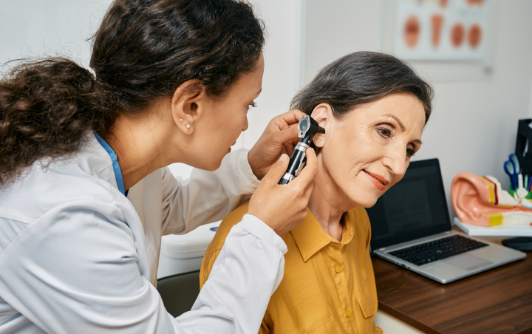
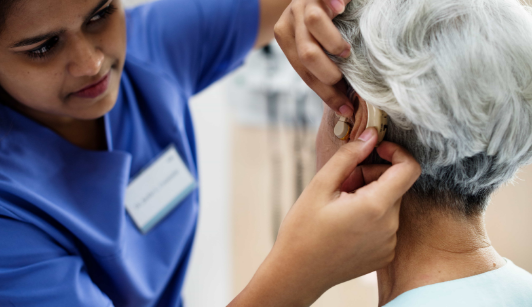
Getting tested for an ear disorder will help identify the problem so treatment can start as soon as possible. Your ENT doctor will likely want to do testing for your type of ear problem before recommending treatment.
Extra Tip
Many audiological diagnostic tests are performed in as little as 30 minutes.
Audiogram
An audiogram is a graph of the softest sound (pure tone) a person can hear in each ear at different frequencies. An audiogram can help determine if a person has hearing loss. The pattern of the hearing loss on an audiogram may help diagnose the cause of the hearing loss. For example, if there is only one steep dip in the sound level on either side at some frequency, there’s likely an obstruction in one or both ear canals.
ENTs will usually monitor for changes over time to see if treatment is needed. An audiologist evaluates a patient by taking a medical history and performing a general physical exam. The next step includes using specialized instruments to measure how well sounds are transmitted through the ears and middle ear to the inner ear and brain.
Extra Tip
Before audiograms, clean your ears of any wax buildup to ensure a clearer reading.
Tympanometry
This test records the sound waves produced when someone talks or has their ears blocked by putting plugs in them. It can detect changes in the middle ear and air-bone gaps. This test is done by placing a small tube in each ear canal and measuring the pressure at different frequencies. Tympanometry testing is usually painless, and most people tolerate it well, but some people experience discomfort during the test. If tympanometry shows an abnormality, additional tests may be needed to determine the cause of hearing loss.
ENT specialists use tympanometry to diagnose problems with the outer, middle, and inner ears, such as:
- Eardrum perforation
- Infection
- Sudden sensorineural hearing loss (SSHL)
- Other causes of hearing loss
The results from this test will help them identify potential causes for your specific symptoms.
Extra Tip
Before your test, avoid any unnecessary loud noises. Your ENT doctor will give instructions about what not to do before the test starts and what to do after it’s over.
Otoacoustic Emissions (OAE) Testing
Otoacoustic emissions are a noninvasive diagnostic test that measures the amount of sound energy produced by the inner ear. OAE testing can detect several ear disorders, including:
- Sensorineural Hearing Loss (SNHL)
- Peripheral Hearing Loss (PHL)
- Conductive Hearing Loss (CHL)
- Presbycusis
Otoacoustic emission testing is noninvasive and does not involve harmful radiation or drugs. The ear canal is gently cleaned before inserting a probe into it for each test; otherwise, there are no special requirements for ear cleaning. In most cases, children too young to cooperate can be tested in a quiet area, so they don’t have to sit still while wearing headphones.
Extra Tip
Otoacoustic emission tests should be performed on newborns because hearing loss can often present at birth.
Implantable Devices
Cochlear Implant
A cochlear implant is a device that provides sound to people who are severely or profoundly deaf. This device sends an electrical signal to the auditory nerve, which stimulates the brain’s ability to process sound and create an awareness of sounds in the environment. Cochlear implants are used as a treatment to help those suffering from sensorineural hearing loss, where there has been damage to the inner ear called the cochlea.
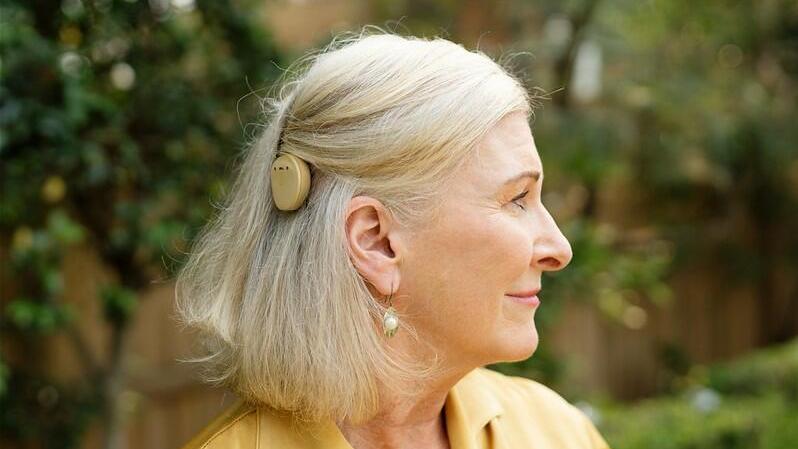
Extra Tip
Bone Anchored Hearing Devices
Bone-anchored hearing devices are an alternative to traditional hearing aids that can be used with patients with conductive and mixed hearing loss. The device is surgically implanted in the bone behind the ear and transmits sound vibrations through the skull to the inner ear. In some cases, other benefits of this procedure include a natural sound quality and improved speech discrimination and cognitive function.
There are two main types of bone-anchored hearing devices:
- Auditory osseointegrated implants
- Malleable or wearable prostheses
Auditory osseointegrated implants involve making a small hole in your skull and anchoring the implant directly to your skull bone. Wearable devices usually have two main parts; a sound processor is worn behind or in front of your ear and a section containing hearing instruments that fit over your ear.
Extra Tip
Bone conduction hearing aids are an option for people with hearing loss associated with outer or middle ear problems or those with profound hearing loss in one ear.
Hearing Aids
- Behind-the-ear (BTE)
- Canal-type (ITE)
- Receiver-in-canal (RIC)
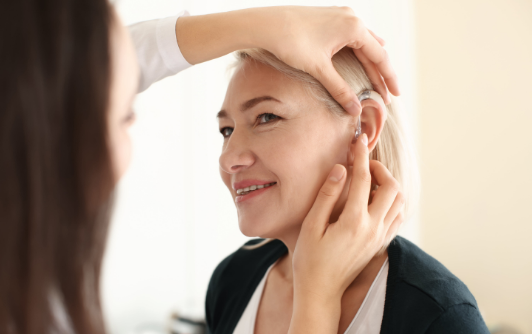
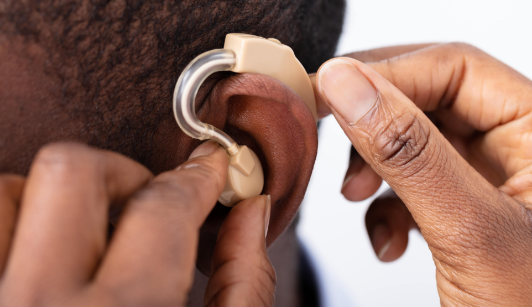
Extra Tip
Practice taking care of your hearing aids by regularly cleaning them and keeping them properly stored when not in use.
Vertigo


Extra Tip
Tinnitus

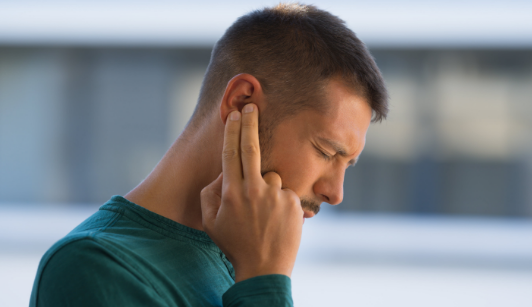
Extra Tip
Otology, Neurotology and Skull Base Surgery

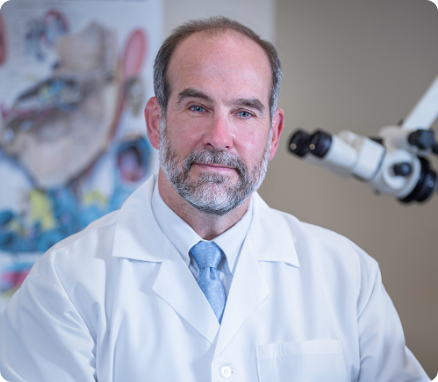
Conditions That Contribute to Ear Disorders
- Ear Wax
- Noise Exposure
-
Ear barotrauma
(pressure-related injury with flights or
diving)
Frequently asked questions
Have questions? We are here to help.
An audiologist is a licensed, certified professional who specializes in helping patients with hearing loss. While OTC devices do not require a diagnostic hearing test, they do rely on the consumer to determine if they have perceived mild to moderate hearing loss. Many people are not able to accurately determine their degree of hearing loss. A diagnostic hearing test completed with an audiologist will provide accurate information on both the degree and type of hearing loss.
An audiologist can then help you determine if OTC or prescription hearing aids are right for your communication needs, or if you need a consultation with an otologist (ear physician). The hearing test can also be useful to self-fit an OTC device or to precisely program a prescription device. There is an overwhelming amount of information available on hearing technologies, and your audiologist can provide clarity and direction to ease you through the process to improved communication.
If you do decide to purchase your hearing aid with us, we offer servicing of the device and maintenance that would not be included in the purchase of an OTC device, as well as a warranty for repairs and device malfunction, which many patients find of value when making such a large purchase. Please reach out to our dedicated audiology receptionist at 401-626-3748 for more information.
Univoto participates with the following plans: Aetna, BlueCross BlueShield of RI, Cigna, Medicare, Neighborhood Health Plan of RI, Tricare, Tufts Health Plan, United Health Plan, Harvard, Coventry (First Health), Humana Senior Plans.
Please note that Tufts Health Plan and Harvard become Point32Health, and merge, as of January 2024.
Also, keep in mind that there are some plans that look like a Cigna plan that actually go through a third-party benefit administrator such as ‘MultiPlan’. We are not in network with those plans. We recommend verifying with your insurance company directly that we are in network. Provide them our Tax ID 05-0319479, and the practice name ‘University Otolaryngology’, and they should be able to verify our participation.
The best way to know if OTC hearing aids will work for you is to see an audiologist for a comprehensive hearing evaluation. This evaluation will show you the degree of hearing loss and the part of the ear—outer, middle, or
inner—that is causing your hearing loss. This information, taken together, will help you decide whether an OTC hearing aid is your best choice or if your needs would be better addressed by a prescription hearing aid.
OTC hearing aids will work if you have a mild to moderate hearing loss. They are not effective for a moderate to severe degree of hearing loss. You must be 18 years or older to wear OTC hearing aids. Children should never wear them.
You must consult a medical provider before buying an OTC hearing aid if you have any of the following medical conditions:
- ear deformity
- fluid, pus, or blood coming from the ear
- hearing loss or ringing (tinnitus) that occurs in only one ear or that is noticeably different in one ear
- pain or discomfort in the ear
- history of excessive earwax or feeling that something is in the ear
- pain or discomfort in the ear
- sudden, quickly worsening, or fluctuating hearing loss
- vertigo or severe dizziness
Many places may sell OTC hearing aids: your local pharmacy, big-box stores such as Walmart, or online providers. You will make the decision about what you buy, just like any other item on the shelf. You may be able to ask store staff for help; however, these staff members likely do not have specialized training in hearing loss and hearing technology programming. It is important to read all information on the box before buying a device. You may not be able to return the hearing aids once you buy them.
Audiologists have extensive training in ear, hearing, and balance disorders and have either a doctoral or master’s degree. They can explain your hearing loss and help you consider the hearing aid that is best for you. Some audiologists will help you with basic maintenance of your OTC hearing aid for a service fee.
An audiologist is the expert in hearing health care—–they can help you find a device and supply tips for you and your individual hearing needs. They will also be able to check your hearing over time to see if it remains stable or worsens. Regular check-ins are important: they reveal whether your chosen hearing aid (OTC or prescription) is
providing enough sound to meet your hearing needs—– or whether you and your audiologist should discuss other options. The common goal between you as the patient and the audiologist as the provider is to help you create a plan and a path toward improved hearing.

